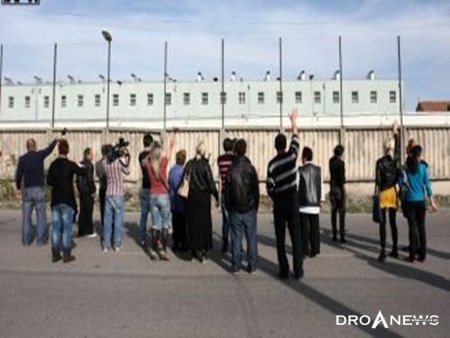Aleko Tskitishvili
Recently, protest of Geguti prison inmates was one of the most urgent topics in Georgian media. Hundreds of prisoners used different forms of protests and requested resignation of the prison director. They blamed the administration in physical abuse and inhuman treatment. Contradictory information was spread by different parties that put society in obscurity. Minister of Prison Sozar Subari claimed “somebody from outside” tries to escalate discontent of prisoners.
Presumably, it is time for the government to fully acknowledge the real causes of the protests in Geguti and other penitentiary establishments. We can constantly blame aliens in escalating situations inside prisons and look for perpetrators outside but finally current government and particularly Ministry of Penitentiary is responsible for the situation. Even if somebody operates processes from outside, it proves the Ministry is not capable to supervise the prisons, which subordinate to them.
Of course, version about regulating processes from outside is grounded enough, but they should make more concrete clarifications who and why escalates situation in the penitentiary establishments. Investigation shall be launched and concrete perpetrators must be exposed. Generally, the Ministry directly or indirectly indicates at two powers, who are interested in the chaos in prisons: political party United National Movement and criminal world – so called thieves-in-law.
It is noteworthy that last summer, 1359 inmates of Geguti prison sent joint letter to the Human Rights Center, to few other nongovernmental organizations, to the Georgian Bar Association, Prime Minister, Chief Prosecutor, to the members of the Government and Parliament of Georgia. They urged for the reaction on the problems listed in the letter. Namely, they requested to annul Article 223 (1) (membership of criminal world and thieves-in-law) of the Criminal Code of Georgia. According to their position, many people were illegally placed in prison under this particular article.
In response to this letter, Human Rights Center prepared a statement, where presented its position that annulment of the article is inadmissible. In parallel to it, the Center underlined that the article shall not become source of illicit repression against people, that used to happen in the past years (case of football player Giorgi Demetradze). Our position is that in some cases confession statement of a person that he/she is member of the criminal society was enough ground for relevant institutions to convict them under Article 223(1). The status shall be proved by concrete actions. Apart to that, investigation shall prove that person acts in accordance to the interests of the criminal world. Only based on these circumstances, person can be charged and convicted under this article.
Afterwards, we remember mass hunger-strikes in prisons. Particularly harsh forms of protest were applied in Geguti prison. This mass protest was fully logical and legitimate follow up of the TV-statement of the Minister of Justice Thea Tsulukiani saying that establishment of the Commission on Miscarriages of Justice was delayed for uncertain time. The government found it was problem to pay compensations to potential victims of unfair judgments. Thus, the state told people, they no longer care about their problems. Whilst majority of Georgian populated voted for the Georgian Dream because restoration of justice, revision of illegal judgments and investigation of the cases of torture victims were one of the main priorities of their pre-election program.
Almost nothing is done in this direction except court proceedings on 17 senior prison officials, which has already finished and inadequately low imprisonment terms were imposed on the people convicted in the torture of prisoners. Numerous cases on the victims of torture are still on the shelves in the prosecutor’s office and nobody intends to re-investigate them. However, big part of torture victims is still in prisons. Many of them were tortured during investigation period to obtain confession statements from them. These people are illegal prisoners, because fair judgment cannot be passed based on the statements obtained through torture.
Number of prisoners, whose charges were falsified, is also high. Those people expected their cases to be revised but after elections the new government deceived them. Citizens released from prison under status of political prisoners also wait revision of their cases. Although their criminal records were removed, judgments still exist. In other words, these people are former political prisoners and spies/state traitors too.
Aforementioned factors are triggers of increased discontent and protest in prisons that is aggravated by unresolved health problems of prisoners. We see progress in penitentiary system, where torture and inhuman treatment is no longer a systemic problem, but medical care is still weak point of the system. Prisoners massively complain about grave diseases like tuberculosis and Hepatitis C.
Here is the extract from a young prisoner’s letter sent from Prison # 6. “I have been in prison since February 14, 2007. In the moment of detention I did not have any health problems. The regime illegally seized my freedom and then seized my health too. Using unsterilized medical tools doctors infected me with chronic Hepatitis C. This disease is cutting years off my life.”
In absolute majority of letters sent to Human Rights Center from penitentiary establishments prisoners complain about health problems and urge us for help. Although the Ministry takes some steps to address the problem, the number of similar letters has not reduced yet; just the opposite, it is increasing.
The state cannot hide from its obligation to find solution of the current problematic situation. I think, one method is to increase state funding for medical care of prisoners in order to enable the Ministry of Corrections to timely response to the complaint letters of prisoners with health problems.
News
December 13, 2023
Ethnic minorities outside the peace dialogue
November 6, 2023
‘Peace’ agenda of political parties
Popular
Articles
February 13, 2024




